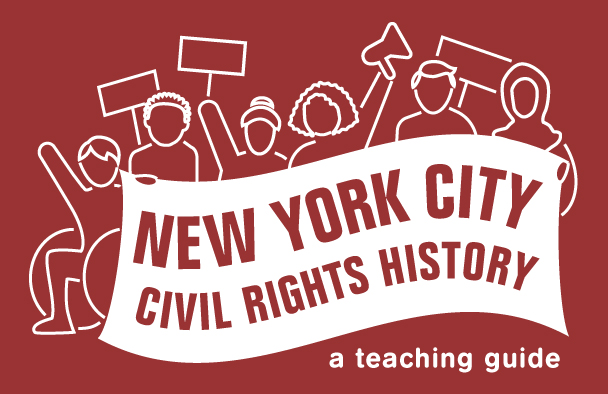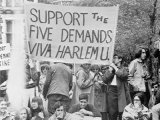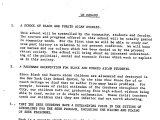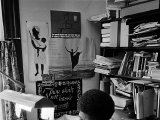You are here:
Audre Lorde and Student Protest at CUNY
Audre Lorde described herself as “a black feminist lesbian mother poet.”1 She was born in Harlem in 1924. Her parents were immigrants from Granada. Lorde was legally blind as a child and reported that she didn’t speak until she was 5. Some of her writing describes her experiences with education for children with vision disabilities in New York City.2
Read More
As an adult, Lorde made a life for herself as a writer, activist, and educator. She was a professor in the City University of New York system. She designed her classroom to help her students grow personally, politically, and culturally.3 She worked in solidarity with student protesters, including students who were part of the movement to make CUNY’s enrollment and curriculum more inclusive of Black and Puerto Rican students.
Later in life, Lorde described her experience of chronic illness, including breast cancer. Due to her cancer, she had a mastectomy (the surgical removal of one breast). Despite pressure from her doctors, Lorde refused to wear a prosthesis, or an artificial breast. She insisted instead that she did not need to make her body conform to other people’s ideas of a normal body.4
Lorde wrote that as a child she had been “fat, black, nearly blind, and ambidextrous,” but she did not talk about herself using the term disability or disabled.5 Scholar Sami Schalk encourages us to think about how Black people negotiate and experience disability, and how they have at times worked for racial and disability justice together, even if they have not used the term disability in their work.6
Lorde’s ideas about how people’s lives are shaped by multiple parts of their identities, including race, gender, sexuality, class, ability, body size, and more, have helped many people think about disability. Lorde offered an example of understanding that people experience multiple kinds of marginalization or oppression, while refusing to make a “hierarchy of oppressions.”7
Recognizing Lorde’s work as an activist educator, we can ask how her experiences across her intersecting identities and experience with racism, sexism, heteronormativity, and ableism influenced the kind of teacher she chose to be.
Audre Lorde, “Age, Race, Class, and Sex: Women Redefining Difference,” in Sister Outsider: Essays and Speeches by Audre Lorde (Trumansburg, NY: Crossing Press, 1984), 114–23. ↩︎
Audre Lorde, Zami: A New Spelling of My Name (Watertown, MA: Persephone Press, 1982). ↩︎
Audre Lorde, “‘I teach myself in outline’: Notes, Journals, Syllabi, and an Excerpt from Deotha,” Contributors Iemanjá Brown and Miriam Atkin, https://cuny.manifoldapp.org/projects/audre-lorde-i-teach-myself-in-outline-cuny-lf. For more on Lorde’s work in the classroom, see Conor Tomás Reed, New York Liberation School: Study and Movement for the People’s Univeristy (New York: Common Notions Press, 2023). For more on the 1969 City College protests, see The Five Demands, directed by Greta Schiller and Andrea Weiss (2023; Brooklyn: Icarus Films), and their related teaching resources. ↩︎
Audre Lorde, The Cancer Journals (London: Penguin, 2020); Tracy K. Smith, “How Audre Lorde’s Experience of Breast Cancer Fortified Her Revolutionary Politics,” LitHub, October 14, 2020, https://lithub.com/how-audre-lordes-experience-of-breast-cancer-fortified-her-revolutionary-politics/. ↩︎
Alison Kafer and Eunjung Kim, “Disability and the Edges of Intersectionality,” in The Cambridge Companion to Literature and Disability, ed. Clare Barker and Stuart Murray (Cambridge, UK: Cambridge University Press, 2017), 123-138. ↩︎
Sami Schalk, Black Disability Politics (Durham, NC: Duke University Press, 2022); Moya Bailey and Izetta Autumn Mobley, “Work in the Intersections: A Black Feminist Disability Framework,” Gender and Society 33, no. 1 (February 2019): 19-40. ↩︎
Audre Lorde, “There is No Hierarchy of Oppressions,” in Interracial Books for Children Bulletin 14, no 3,4 (Homophobia and Education issue, 1983); Audre Lorde, “There is No Hierarchy of Oppression” (read by Lauren Lyons), accessed March 6, 2023, https://www.youtube.com/watch?v=i1pNsLsHsfs. ↩︎



